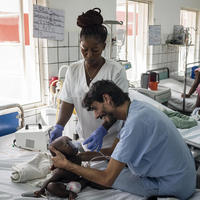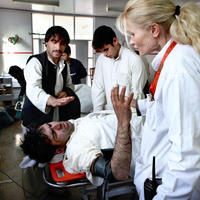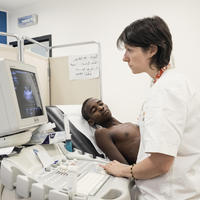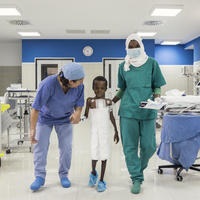From the first mission to over 9 million patients treated, without discrimination.
Milan, 1994: EMERGENCY, a humanitarian organisation founded to help civilian victims of war and poverty, was born.
Since then, we have worked in 18 countries, building hospitals, surgical centres, rehabilitation centres, paediatric centres, first aid posts, health centres, clinics and mobile clinics, a maternity centre and a cardiac surgery centre. At the request of local authorities and other organizations we have also contributed to the restructuring and the equipping of existing health facilities.
And, right from the beginning, we started the campaign that resulted in Italy banning anti-personnel mines. Our doctors, surgeons, and nurses had seen and continued to see the horrors of war and its effects every day: that is why we could not help but engage in the daily advocacy of values of peace, solidarity and respect for human rights.
In 2001, because we knew what war really was, and we knew very clearly what the consequences of an armed intervention in Afghanistan would be, we asked citizens to express their repudiation of war with a “rag of peace”, which became a symbol of the opposition to war.
While the campaign “Italy Out Of War” was launched in opposition to our country’s participation in the war against Iraq, we continued our work, providing free and quality care to those who needed it. These were victims of mines, war, but also of the poverty that results from war, and which often compromises an entire country, sometimes even years after the end of the conflict.
In 2008, we developed, together with a number of African countries, the “Manifesto for a Human Rights-based Medicine” to advocate for healthcare based on equality, quality and social responsibility. We declare the „right to be treated“ as a fundamental and inalienable right belonging to each member of the human family. We believe that medical treatment must be available to everyone: for medical care to be truly accessible, it has to be completely free of charge; for it to be effective, it has to be of excellent quality.
Our concept of healthcare
We build the hospitals where we work, to ensure the highest possible level of treatment. Right from the project stage, our goal is to guarantee an efficient working environment for staff, and a comfortable one for patients. Moreover, we use alternative energy sources and ecological waste disposal solutions. We limit our maintenance costs and respect the environment, be it in Khartoum or Kabul.
We also want our hospitals to be beautiful, ‘scandalously beautiful’: because beauty becomes a sign of respect for people deeply impacted by war or illness, and a beautiful place offers the perfect environment for patients to regain their dignity. Our patients gather around these gardens of roses, sunflowers and flowering bushes. Those few square feet of colour and peace become their meeting point, a place to ease their minds.
We intervene in emergencies, but we also look a bit further ahead: we offer theoretical and practical training for local staff, so they can become autonomous and independent.
When recruiting auxiliary staff, priority is given to the most underprivileged groups. We give widows, amputees and war victims the chance to earn a living and be independent.
We guarantee three meals a day for our patients and their relatives. We provide over 80.000 meals a month in countries where patients normally have to pay for their food in hospitals.
To find out if we have achieved our goal, we ask a simple question: „Would I let my mother or brother stay in this hospital?“ If the answer is yes, it means we are doing a good job.
Training and employment
In all of our hospitals, training national staff is one of our top priorities, because by training local staff, we contribute to the strengthening and long-term sustainability of the local healthcare system. Theoretical and practical lessons allow us to share knowledge and experience with local staff, encouraging professional growth and independence: we want to train professional staff that are able to run the hospitals independently.
In many of the countries where we operate, our training is also officially recognised by local health ministries. For example, in Sierra Leone, we have organised courses for the training of anaesthetic nurses, in Afghanistan, our hospitals are recognised specialist centres in paediatrics, surgery, and gynaecology.
In Sudan, we train local staff and apprentices through an on-the-job training program and seminars, in collaboration with the Port Sudan nursing academy. In Sulaymaniyah, Iraq, patients in the Centre for Rehabilitation and Social Reintegration can attend vocational training courses in metalwork, carpentry, tailoring, leather processing, and shoe production, in order to learn a skill that is compatible with their disability. At the end of the courses, we offer ‘graduates’ economic assistance so they can start their own craft workshops or cooperative: Over 300 workshops now have the EMERGENCY sign above their door.
For non-sanitary roles, in all of our hospitals we give precedence to the most vulnerable sections of the population, such as widows and people with disabilities, when recruiting. In this case, for us, ‘training’ also means giving victims of war and landmines a second chance.
What’s going on
We are currently present in Afghanistan, Iraq (Iraqi Kurdistan), Central African Republic, Sierra Leone, Sudan, Uganda (currently under construction) and Italy. All structures are equipped with laboratories, blood banks, pharmacies, radiology equipment and in some cases physiotherapy services.
In all wards and outpatient departments, the following are made available: oxygen sources, pulse oximeters, equipment for nebulizers and spacers, syringe and infusion pumps and mechanical aspirators.
Every day, over 270 international expert specialists work in the field with us and we still need professionals (not volunteers but specialist personnel with specific professional profiles) who want join EMERGENCY on the journey towards the daily practice of the right to be treated. It is an opportunity for all to take part in an extraordinary professional and human experience.
For information on job opportunities with EMERGENCY please visit the website.
Published in GI-Mail 09/2018 (English & German edition). Sign up for GI-Mail here. 
Tip: More up to date educational events can be found online in the Education Database »medicine & health«.




